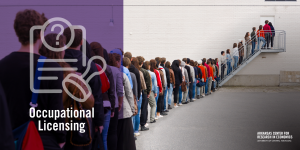By Alex Kanode
The 2021 legislative session saw many changes concerning licensing of occupations in Arkansas.
The Red Tape Reduction Working Group released a 2018 report stating that there were 704,141 occupational licenses in Arkansas. That amounted to 52 percent of the state’s labor force at the time, according to the Bureau of Labor Statistics, or slightly more than one in every two jobs in the state.
Occupational licensing refers to sets of requirements that a person must meet before they are legally allowed to work in a given profession. These can be fees, education, experience, or criminal background. Reform in occupational licensing remained a prominent issue for the legislature in 2021.
Proponents of occupational licensing claim that it can be a way to protect consumers, but it can also be a way to protect producers from competition. High fees, lengthy education requirements, and excessive criminal background checks can keep people out of work. ACRE Scholar and UCA Associate Professor of Economics Dr. Thomas Snyder found evidence of this in his paper “The Effects of Arkansas Occupational Licensure Regulations”. If Arkansas reduced the number of lower income licenses to that of their neighbor Missouri, there could potentially be a .75% decrease in the state unemployment rate.
The Arkansas 93rd General Assembly passed general licensing reforms for many groups, including those below the poverty line, military service members, veterans and their spouses. When it is easier to get a license, it’s easier to earn a living. The legislature did a great job helping these groups. However, there are still improvements Arkansas legislators can make moving forward, especially with people looking to move to Arkansas from other states.
For people just starting out, licensing fees can be a serious impediment to working. Some licenses require $100 or more in fees to be able to work. That $100 can be a large barrier, especially on top of the education and experience requirements someone has to go through.
Act 725, with lead-sponsors Senator Ben Gilmore (R-26) and Representative David Ray (R-40) was designed to make it easier for people to work. This bill introduced an application fee waiver for people with incomes below 200% of the federal poverty line. People on programs such as Medicaid, SNAP, or unemployment are also eligible. This reduces one of the barriers to people finding work.
Another example is Act 135, sponsored by Senator Ricky Hill (R-29) and Representative Roger D. Lynch (R-14). This legislation improved portability of licenses for military service members, veterans and their spouses. Most licenses are determined at the state level, which makes it costly and difficult to move from one state to another.
However, Act 135 only improved portability for military service members and their spouses. There are still licensed people looking to move to Arkansas who aren’t married to someone in the military. The Arkansas legislature considered a bill, House Bill 1667 sponsored by Representative Tony Furman (R-28), that would have expanded the license portability improvement to all potential Arkansans.
This policy, known as Universal Recognition, is gaining traction across the United States. Nearby states Missouri, Mississippi, and Kansas have all passed universal recognition legislation in the last year. Universal Recognition legislation usually stipulates that if an applicant has had a license in another state for at least a year and is still in good standing with that state’s board, they receive a license in the state they’re applying to. Applicants also often have to reside in the state they’re applying in and pass a criminal background check. This allows for easy transfer of experienced workers between states.
Unfortunately, HB1667 did not make it out of committee. During the April 1st House Public Health and Safety Meeting, legislators expressed fears that licensing boards wouldn’t be able to discover if applicants had medical malpractice lawsuits or a criminal history. But even with a criminal background check, the process would be much quicker than license transfers are currently. Arkansas legislators should watch how similar laws are working in nearby states. It’s now much easier for licensed individuals to leave Arkansas for Missouri than it is for a Missouri licensee to work here.
The legislature did a lot of good for Arkansas in the 2021 session. Lawmakers improved access to work for people below 200% of the poverty line by removing the barrier of upfront fees. They improved portability of skills for military members, veterans, and their spouses by allowing for automatic recognition of other states’ licenses. These weren’t the only changes. There were improvements for licensing people with a criminal history, ensuring that people don’t have to earn two licenses for the same job, and many more changes for specific licenses.
All of this should be praised, but legislators should also look forward to future improvements to make Arkansas open for business.

